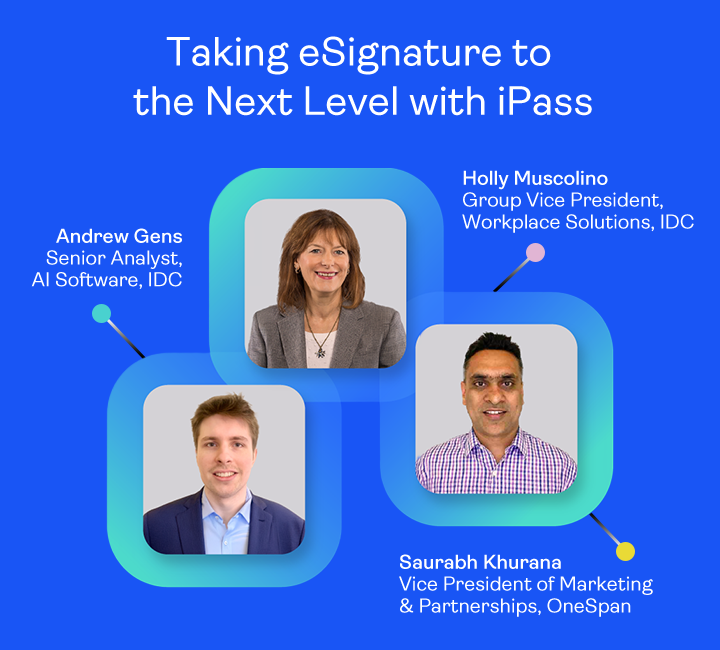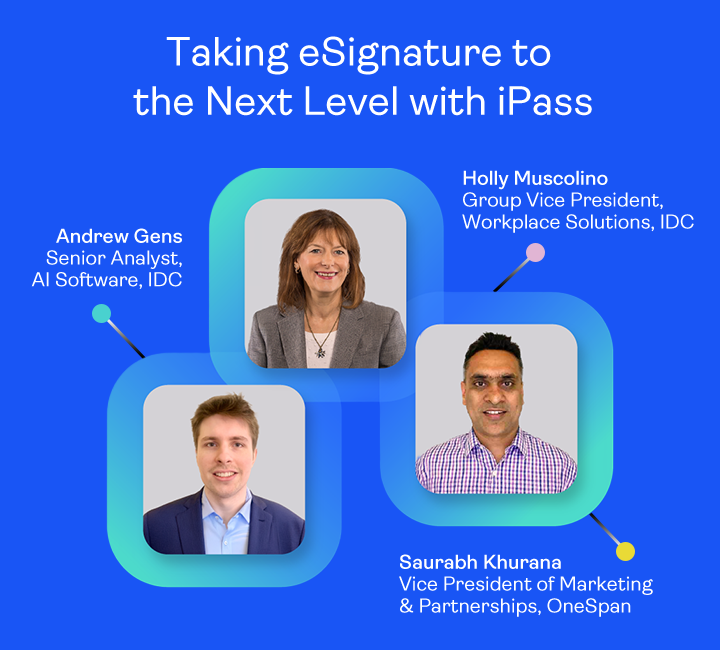Taking electronic signature to the next level with iPaaS: Webinar recap
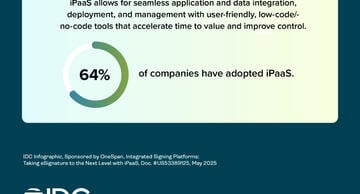
Imagine paying double or triple the cost for electronic signature solutions due to redundant tools operating in siloed pockets across the enterprise.
This is the reality for many IT leaders. In fact, a new IDC Infographic, sponsored by OneSpan, indicates that 97% of organizations use two or more eSignature tools, with some maintaining three or four solutions.
Today’s IT budget is undergoing critical evaluation to reduce bloat, drive end-to-end automation, and cut unnecessary costs. It’s never been more mission-critical to regain control and achieve full ROI from your digital agreements solution. But for CIOs and IT leaders responsible for digital transformation, the challenge doesn’t end there.
Today, delivering seamless digital experiences hinges on one critical capability: integration. Enterprise eSignature solutions must weave into a diverse ecosystem of applications, data formats, and business processes. However, integration costs and complexities are holding organizations back.
We recently hosted a webinar with guest speakers from IDC to uncover what's behind this trend. During the webinar, we highlighted survey data from the IDC Infographic, sponsored by OneSpan: Integrated Signing Platforms: Taking eSignature to the Next Level with iPass. It reveals that iPaaS has become a strategic enabler for seamless integrations and workflow automation, delivering faster time to value.
Let’s explore this through the key takeaways from the webinar.
Challenges with electronic signatures
Consolidating eSignature solutions is a common theme across enterprise organizations, often to achieve cost savings, increase efficiency or achieve greater ROI. For some IT departments, this exercise is easier said than done.
We asked webinar attendees for their real-world experience in terms of what is blocking consolidation efforts at their organizations. A majority of viewers cited a lack of company-wide consolidation strategy as the main reason, followed closely by gaps in use case coverage.
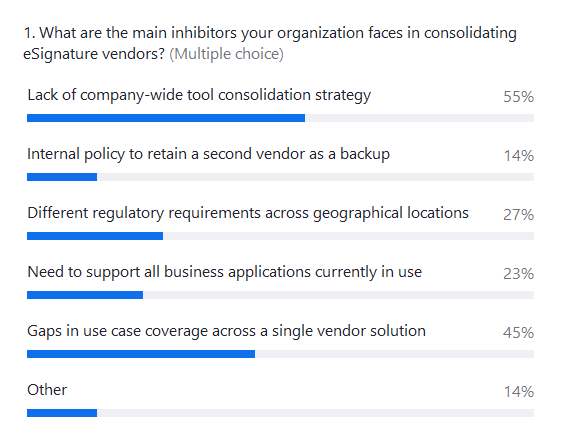
Organizations that have digitized their signing workflows face other challenges as well, especially when using more than one electronic signature vendor. These include siloed or disconnected applications and data sources, and little-to-no-ability to automate workflows due to lack of observability and data flow management.
The main symptom of that is paper, which is surprisingly still omnipresent.
According to the IDC infographic, “The costs of digitization and integration with other applications prevent companies from fully digitizing signing use cases.”
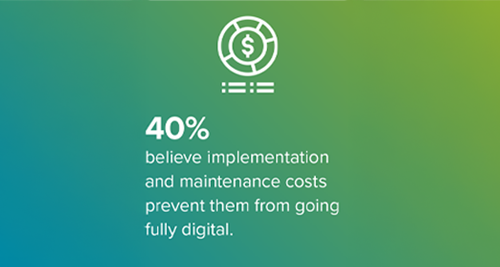
Source: IDC Infographic, sponsored by OneSpan, Integrated Signing Platforms:
Taking eSignature to the Next Level with iPass (doc #US53389125, May 2025)
Sound familiar? If you said yes, then iPaaS (Integration Platform as a Service) may provide you with an opportunity to lower the cost and effort to fully digitize agreement workflows.
iPaaS: The circulatory system of the enterprise
What exactly is iPaaS?
During our webinar, Andrew Gens, IDC’s Senior Analyst, AI Software defined it as “software and services typically consisting of development and testing capabilities, integration management, and runtime capabilities, including legacy enterprise service buses that support the family of web service standards and API lifecycle management.”
In other words, iPaaS is a cloud-based software model for integrating data from multiple applications into a single solution.
iPaaS connects applications to ensure data sharing across systems and silos
iPaaS has emerged as a game-changer for IT teams scaling eSignature across the enterprise. Many organizations are already reaping the benefits of modern connectivity with iPaaS. According to IDC’s 2025 Worldwide AI-Enhanced Connectivity Automation Survey, 63.7% have adopted an iPaaS solution.
Those that adopted iPaaS observe the following benefits:
- One system to coordinate and execute data movements through the enterprise
- Improved data sharing across systems
- Accelerated integration development to improve efficiency and productivity
- Consolidated integration and automation toolsets
By enabling rapid integration of any data, in any format, from any system, iPaaS addresses the core pain points of fragmented digital tools. Unlike traditional integration methods that require time-consuming coding and customization, iPaaS platforms shorten deployment times. Organizations can rapidly link their enterprise eSignature platform with business systems, ensuring that information flows smoothly and securely across the enterprise.
Scalability is another critical advantage. As organizations grow and their integration needs become more complex, iPaaS platforms offer the flexibility to adapt without rebuilding from scratch. IT managers can expand their integration architecture to support new tools, data types, and business units—all while maintaining centralized governance.
In essence, iPaaS helps transform enterprise eSignature from a collection of isolated applications into a strategic asset tightly embedded within core business processes. For CIOs and their teams, this means unlocking efficiencies, mitigating security risks, and delivering a superior user experience.
Learn more about iPaaS for faster eSignature integration and scalability
The opportunity is clear: Forward-thinking enterprises are turning to iPaaS to unify their eSignature ecosystems and unlock the full potential of digital agreements — helping businesses deliver faster, more secure, and more consistent experiences.
As a trusted integration partner, we offer multiple eSignature integration options, whether through our API, embedded integrations, or low-code/no-code integrations. We launched a new set of low-code/no-code integrations last year, built on our iPaaS-based solution, the OneSpan Integration Platform. Since then, we have continued adding new capabilities and have ambitious plans for future development, including Bring Your Own iPaaS and AI-powered features.
We are looking at offering connectivity between our iPaaS platform and others such as Zapier, Boomi, and Workato







